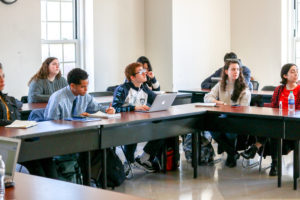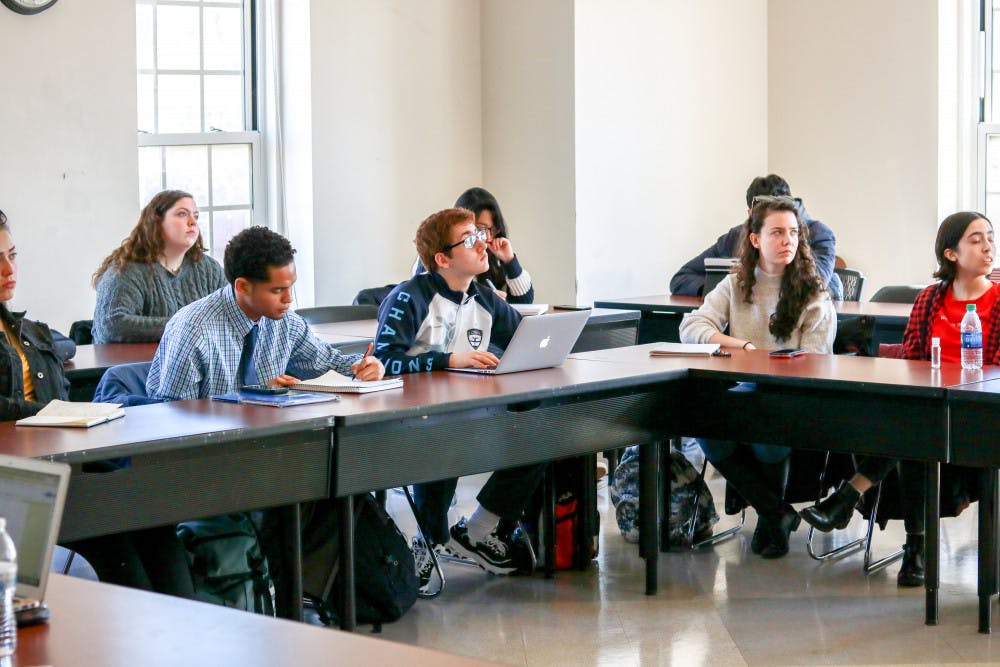By Sumayah Medlin
Staff Writer
As part of the Politics Forum Series, Professor Alexander Garlick of the political science department presented his lecture on the effect of lobbying groups on policy processes, which was held on March 26 in the Social Sciences Building Room 223.
The lecture, “What do Groups Want?,” focused on how lobbying groups affect the policy process in an effort to inform citizens. The talk consisted of a sample of the research in his upcoming book, “The Menu,” which has yet to be released. His title was inspired by an old Washington, D.C. saying, “If you’re not at the table, you’re probably on the menu.” In his presentation, Garlick promised to reveal how the menu gets created.

At the start of his lecture, Garlick — who formerly worked on Capitol Hill as a congressional fellow for the American Political Science Association — presented an infamous edited picture of former House Speaker John Boehner wearing a NASCAR suit with patches symbolizing his biggest donors, such as AT&T and the Walt Disney Company. The photoshopped picture was presumably inspired by former non-partisan Minnesota Gov. Jesse Ventura’s suggestion that politicians should wear NASCAR suits when they campaign, according to USNews.com.
“‘They (could) have their sponsors, or donors, on big patches. Then we can learn as citizens who owns (which) candidate,’” according to USNews.com.
Garlick explained that businesses and organizations donate to politicians or to a certain political party, which almost guarantees that the values of the party or politicians and their donors will align.
Garlick believed that this is the reason why it is so difficult to get certain programs into effect, such as the Green New Deal or Medicare for All, which he said would decrease economic inequality. Political and policy implications including polarization, inequality and mass participation decide how far a bill gets in the legislative process.
“It doesn’t matter what the public supports if the legislators never get to vote on it,” Garlick said.
According to Garlick, lobbying influences politicians’ agendas. They take lobbyists’ views into account when deciding which issues are considered, particularly for passage. There are two types of lobbying — positive, which pushes for a bill’s passing, and negative, which pushes for its rejection. The majority of lobbying is negative and business lobbying is more negative than non-business lobbying. According to Garlick, businesses engage in negative lobbying because they prefer less government interference.
Along with engaging in more negative lobbying, Garlick’s research predicts that some business-lobbyers will tend to support Republican policies. Garlick found these predictions to be true in his research.
For instance, general businesses in Colorado engage in negative lobbying against Republican bills, except when the bill was proposed by another business, which was more guaranteed to serve their particular interest. Garlick also found that when businesses engage in positive lobbying, the bill is usually a Republican bill.
According to Garlick, “business support can particularly help Republican bills during Democrat control.”
A major takeaway is that organizations and businesses have sway in the legislative process. If an organization or a business does not support a bill, it is more difficult for it to get passed by the governor, especially if the bill does not have the support of both businesses and organizations and vice versa.
While the research does say that businesses tend to lobby for Republican bills when they engage in positive lobbying, it does not necessarily mean that businesses are inherently Republican or always side with the Republican party.
Due to the two-party system, it is possible that businesses and organizations do not always agree with one party — they may have certain interests that may cause their support to waver.
According to Garlick, citizens should look out for behind-the-scenes lobbying so that they can be more informed.
“These groups have more of an impact on the state level than they do on the federal level, because fewer people are paying attention,” he said.
Major groups affect politics by deciding what legislators get to vote on, according to Garlick. Knowing this information gives voters an idea of the people to whom their representatives are more likely to pander, as well as why a bill that will objectively help people may not pass. Referring back to the old Washington, D.C. saying, the information gives voters an idea of who is seated at the metaphorical table.







